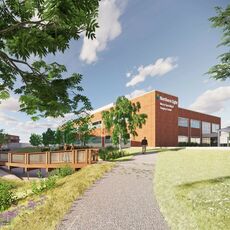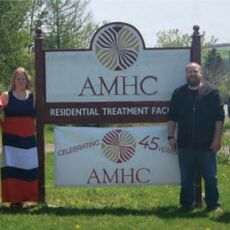Processing Your Payment
Please do not leave this page until complete. This can take a few moments.
Health care
-
Next: Lisa Sockabasin has led Wabanaki Public Health to grow at the speed of a startup
Updated: October 4, 2021A member of the Passamaquoddy tribe, she has put experience in tribal, state and federal governments to work for a health care organization assisting Wabanaki communities in Maine. The nonprofit has expanded from seven employees to 100.
Updated: October 4, 2021On the Record: 2018 Next List honorees Brian Harris, Owen McCarthy talk about what's next now
Updated: October 4, 2021The two Nexters, who founded MedRhythms Inc., a Portland startup whose digital therapeutics may someday help restore nervous system functioning, discuss the growth of the business and what changes lie ahead.
Updated: October 4, 2021With $250K grant, Northern Light looks to improve Mainers' health care access
Updated: September 29, 2021Northern Light Health will use grant funds to study and improve health care access for Mainers whose environment and social conditions affect their well-being.
Updated: September 29, 2021Maine child care providers to receive $73M in federal funding
September 28, 2021The money, from the American Rescue Plan Act, will help child care providers provide bonuses to workers, lower costs to families and replace lost revenue.
September 28, 2021World's largest recording label teams with Portland startup MedRhythms on 'prescription music'
Updated: September 29, 2021An agreement will allow MedRhythms to use Universal Music Group's millions of recordings for the MedRhythms digital therapeutics platform, which combines music, software and clinical sensors to help restore neurological function in patients.
Updated: September 29, 2021Northern Light Mercy Hospital nears finish on $75M expansion, consolidation in Portland
September 24, 2021The build-out of the hospital's Fore River Parkway campus is nearly complete, and Mercy is now beginning the move from its 78-year-old building on State Street, about a mile away.
September 24, 2021Wabanaki Health and Wellness receives $1.4M in federal funding
September 24, 2021Wabanaki Health and Wellness received the additional funding to help improve health services in tribal communities.
September 24, 2021More health care workers are getting vaccinated in Maine, but not everywhere
September 23, 2021New data from the Department of Health and Human Services shows employee vaccination rates are up, especially at hospitals. But five weeks before the state-mandated vaccination deadline, not all health care providers have made progress.
September 23, 2021$940K federal grant will fund MaineHealth research into COVID testing
September 20, 2021The research, with an award from the National Institutes of Health, will explore how to remove barriers to testing and encourage people from Maine immigrant, low-income and homeless populations to get tested.
September 20, 2021How Maine companies are supporting mental health in the workforce
Updated: September 20, 2021The pandemic is the latest source of mental health challenges for many employees and their employers. Mainebiz checked in with a few businesses to see how they're coping.
Updated: September 20, 2021Building health: New needs are driving construction projects at Maine hospitals
Updated: September 20, 2021Aging facilities, growing numbers of patients, and the demands of new technology and care practices are all forcing Maine's health care systems to make big investments in their buildings and infrastructure.
Updated: September 20, 2021From the Editor: No break for the health care industry or its wellness counterparts
Updated: September 20, 2021The past 18 months have validated the need for good hospital systems and wellness sites. COVID exposed the gaps in the health care system and prompted a slew of changes and new investment.
Updated: September 20, 2021Health care providers eligible for $25.5 billion in COVID-19 relief
September 13, 2021The funds include $8.5 billion to set aside for rural providers and $17 billion for providers who can document revenue losses and expenses related to the pandemic.
September 13, 2021Aroostook Mental Health Center to receive $1M for fighting opioid crisis
September 9, 2021Opioid abuse resulted in the deaths of over 500 Mainers last year. The health care nonprofit helps nearly 5,000 residents annually.
September 9, 2021St. Mary’s Health and MaineHealth expand clinical services partnership
September 9, 2021The agreement brings general surgery, cardiology and cancer care specialists and services from MaineHealth to Lewiston-Auburn. The area is currently experiencing high COVID-19 infection rates.
September 9, 2021Mercy Hospital redevelopment in Portland gets final approval
September 8, 2021The 1940s-era hospital building and two neighboring ones are expected to ultimately add 270 units of housing to Portland's West End. With the final green light received, the development team hopes to begin construction early next year.
September 8, 2021

















